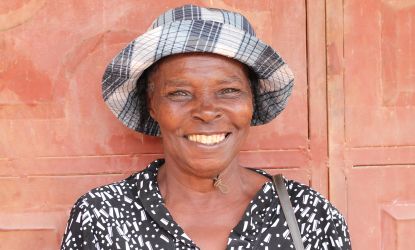Unconditional and conditional cash transfer programs
19%
of our humanitarian assistance is delivered through cash transfers
$9 million
the amount that ActionAid has distributed in cash transfers
500,000
the number of people ActionAid has reached with cash transfers
The advantages of cash transfer programs
Cash transfer programs:
- give dignity to people who have been affected by disasters, and provide a sense of ownership and control in a time of crisis
- channel money into local markets, which are impacted by crises, and shift the power from larger wholesalers or manufacturers to local retailers
- stimulate local employment by kick-starting essential services
- create an opportunity to build women’s economic empowerment, lead to reduction of gender based violence and facilitate women's leadership
- can enable people to get the support they need faster, because it cuts down on transportation time of goods
- give flexibility and freedom, as people can buy items that they need that are not included in standard kits
- are more cost efficient - the Department for International Development estimates that they are 18% cheaper than delivering in kind1 .
How cash transfers support women in emergencies
Gender inequalities and discrimination that women and girls experience in their daily lives mean that they are less able to access life-saving aid and be involved in crucial decision making when disasters hit.
But we know from our emergency response work that women bring vital skills, resources and experience to humanitarian response. We are committed to promoting women's leadership in emergencies, and targeting women with cash transfers is one effective way of doing this.
Evidence shows providing cash to women can reduce physical abuse, rates of child marriage and improve women's health and economic status.2
Mainstreaming protection into cash programming can increase the security and safety of women in a humanitarian response. Managing and receiving cash offers women and girls the dignity, ownership and flexibility to meet wide-ranging and changing needs, both for themselves and their communities.
ActionAid UK’s think piece 'A Feminist Approach to Cash Transfer Programming' explores whether cash transfer programs can be used as a tool to bring about gender equality and whether it promotes women’s empowerment in humanitarian crises.

Hurricane Matthew destroyed 67-year-old Elestine's house and business in Haiti.
ActionAid
How cash transfer programs can change lives
When Hurricane Matthew hit Haiti in 2016, it didn't just destroy 67-year-old Elestine's house. It also destroyed her business.
"Before Hurricane Matthew I used to run a small commerce. I would buy and resell beans, coffee and bananas," she told us. "Since the hurricane, it has not been possible for me to do any commerce. Agriculture has not been practical, the industry was destroyed, so there was no food or livestock being produced."
She walked for five hours to get to ActionAid's Cash for Commerce distribution, to be able to restart her business.
I will use the cash for livelihoods I receive today to restart my commerce. I will buy rice, oil, soap and other miscellaneous items to sell."
She believes that it is important for women in particular to receive cash support. "The reason that only women are receiving cash for commerce grants is because women are more proactive about things. They can do more with the money," she says. "Women are more independent and have initiative."
Tackling cash transfer myths
Myths around the effectiveness of cash transfers are widespread, but evidence collected about cash transfers show these are not founded on fact.
Will people spend cash transfers on goods like cigarettes and alcohol?
A recent analysis of 30 studies of cash transfer programs shows this concern is unfounded. Cash transfers often put in place stricter financial tracking and more robust monitoring systems than traditional distributions of goods.
Mobile money transfers provide accurate records of transfers to each phone and report when funds are withdrawn. Post-transfer monitoring takes place to assess what the transfer was used to purchase, when, and what outcome this had.
Could cash transfers given to women result in violence?
There is currently no evidence that providing cash results in increased violence against women and girls. In fact, evidence shows providing cash to women can reduce physical abuse and child marriage, be empowering, and improve health and economic outcomes.
We continually analyse protection risks, regardless of whether this is in relation to distribution of goods or cash.
Could cash transfers cause security risks?
Security risks should be considered in any response, and ActionAid has committed to integrate protection into all humanitarian responses.
Providing money can be less visible than large scale distribution of goods, and can be transferred through a range of mechanisms that can minimise risk to women, such as transfers to bank accounts, via mobile phones, or through smart cards. The money can then be spent in a more discreet manner, at a number of outlets.
Could cash transfers lead to inflation?
On the whole, cash programming is usually not carried out on a large enough scale to significantly impact the price of goods, and the distribution of cash has positive impacts on rural market development and expansion.
Local level monitoring mechanisms review commodity prices to identify any risks. We also reduce the risk of price inflation and stock shortages by distributing goods alongside cash, or as vouchers to be spent at trusted suppliers.
Page updated 6 February 2025



